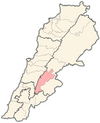Dakoue
Dakoue
Dakoueh, Dekweh | |
|---|---|
Village | |
 | |
| Country | |
| Governorate | Beqaa Governorate |
| District | Zahlé District |
| Government | |
| • Mayor | Raymond al-Ghajar |
| Elevation | 2,920 ft (890 m) |
| Population (2004) | |
| • Total | 800 |
| Location | 3 kilometres (1.9 mi) southwest of Mejdel Anjar, Lebanon |
|---|---|
| Coordinates | 33°41′42″N 35°53′41″E / 33.695°N 35.894722°E |
| History | |
| Periods | Heavy Neolithic, Neolithic, Roman |
| Cultures | Qaraoun culture |
| Site notes | |
| Public access | Unknown |
Dakoue, Dakoueh or Dekweh is a village located 3 kilometres (1.9 mi) southwest of Mejdel Anjar, Lebanon. It is predominantly inhabited by shepherds and farmers.[1][2]
Heavy Neolithic site of the Qaraoun culture
There is a Heavy Neolithic archaeological site of the Qaraoun culture located 700 metres (2,300 ft) northwest of the village where plentiful Heavy Neolithic flint adzes, axes, debitage and waste material were found along with large amounts of Paleolithic materials.[3][4]
Roman temple
Behind the village there are the ruins of a Roman temple that still retains a central courtyard and a front colonnade composed of three columns. The temple was converted into a church and a chapel can be accessed via an opening in the west wall. There is a path leading from the temple to an ancient graveyard with tombs and sarcophagi.[1][2] George Taylor noted the temple was aligned to the south west and classified it as a Prostylos temple. He noted that the decoration of the window, cornice and capital displayed a design unique in Lebanon.[5]
References
- ^ a b Collectif; Jean-Paul Labourdette; Dominique Auzias (1 June 2011). Liban. Petit Futé. pp. 287–. ISBN 978-2-7469-4918-8. Retrieved 18 September 2012.
- ^ a b Dominique Auzias; Jean-Paul Labourdette; Collectif (17 July 2012). Liban 2012 (avec cartes, photos + avis des lecteurs). Petit Futé. pp. 112–. ISBN 978-2-7469-6383-2. Retrieved 18 September 2012.
- ^ Moore, A.M.T. (1978). The Neolithic of the Levant. Oxford University, Unpublished Ph.D. Thesis. pp. 444–446.
- ^ L. Copeland; P. Wescombe (1966). Inventory of Stone-Age Sites in Lebanon: North, South and East-Central Lebanon. Impr. Catholique. Retrieved 29 August 2011.
- ^ George Taylor (1971). The Roman temples of Lebanon: a pictorial guide. Les temples romains au Liban; guide illustré. Dar el-Machreq Publishers. Retrieved 18 September 2012.


